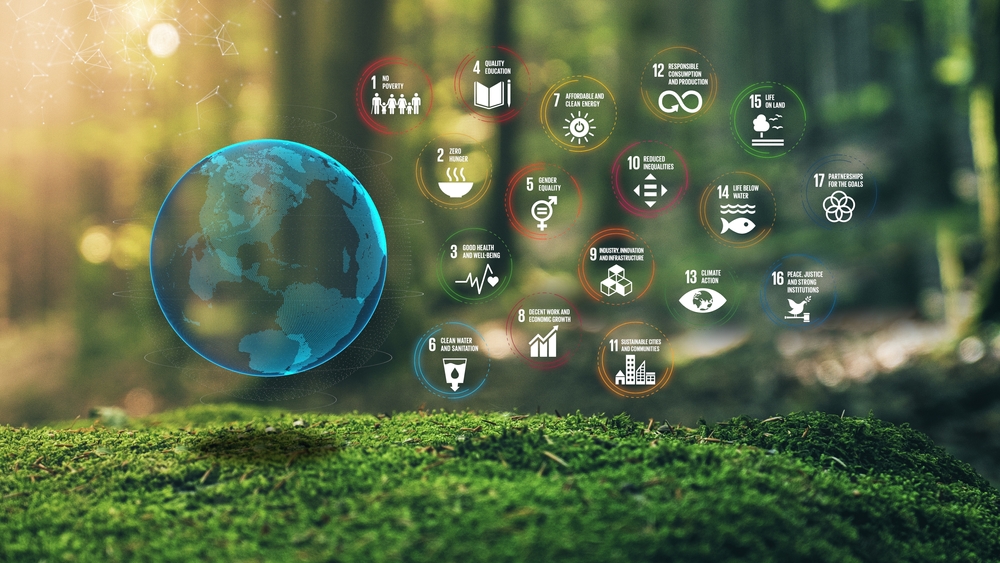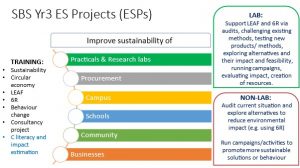
Two initiatives to increase ES in the SBS curriculum
Aligning with our research activities, all schools in FBMH have a curriculum that covers one or more United Nations Sustainable Development Goals, such as 3: Good Health and Wellbeing, 13: Climate Action, 14: Life below water, and 15: Life on Land. Most of our students can also take a UCIL unit, such as Creating a Sustainable World: 21st Century Challenges and the Sustainable Development Goals’ (SDGs).
To improve the Environmental Sustainability (ES) provision in our curriculum, we are now aiming to develop an induction to climate change and sustainability for all our UG and PG students and increase the offering of ES-related project work. Two initiatives piloted in the School of Biological Sciences (SBS) provide a blueprint we could build on.
The Environmental Sustainability Projects (ESPs)
In September 21, Ruth Grady and Maggy Fostier added the ESPs to our portfolio of final year research projects, to recruit students to help with our initiatives to become more sustainable. We had three students in 2021-22, and 14 in 2022-23, showing a rapidly growing interest.
Students are prepared with a programme in semester 1 of weekly live workshops and online resources (see diagram) concomitant with undertaking a Biosciences focused study of either harmful agents or processes for the environment (e.g. microplastics, toxins, manufacturing of lab coats), or a review of new technologies/products developed to improve sustainability. Students move on to their actual projects in the second semester. We work in collaboration with the University’s central waste services and key members of the FBMH Sustainable Lab network.
These projects give students the opportunity to develop skills necessary to address environmental issues and explore or promote solutions that will be beneficial for the future around our research activities, laboratory teaching, campus living or for external organisations. These projects can be dry or laboratory-based, they may require audits or needs analysis, desk and primary research, intervention or implementation of a strategy, creation of resources or campaign material. All require an impact evaluation and evidence-based recommendations. Five projects will be presented at the Faculty’s ES showcase event.
What’s Next
We want to encourage all Schools to consider including ES-related projects in their existing portfolio at UG and PG level (dissertation, clinical audits, communication projects). Students in specific disciplines, such as Psychology (FBMH) and Environmental Sciences (FSE), could also play a vital role in supporting our initiatives to improve ES, so we need to use or develop a system to match initiatives with a student, such as the University’s Living labs initiative.
Climate change induction and the 6R statistical package.
6R is a tool developed by FBMH to manage plastic sustainably in labs, at home and on campus. In 2023, we piloted a 6R statistical package with SBS Year 1 students enrolled in the semester 2 practical units. Following a short induction on climate change and the damages caused by plastics, students were asked to follow the 6R guide for home and campus and record their results via an impact survey.
During a live session, a walk-through analysis of the data using the statistical tests learnt during the semester was performed. In a week, following the 6R guide, 511 students saved 4,893 plastic items (not bought or not used) [mean 10 ± 6], £4,162 [mean 8 ± 6], and they sent 4, 458 extra items for recycling [mean 9 ± 7]. 80% were confident these actions could be maintained and felt empowered to take more actions, with more than 100 students interested in becoming 6R champions. Many more questions were asked to dissect factors that may affect behaviour – details provided on request.
What’s Next?
- The climate change induction and 6R package were well appreciated by the students. Both can easily be shared and adapted to showcase how to design a survey, analyse it and present the results in a formal write up.
- In the summer, we will work across Faculties to determine if we can develop a University induction/training or revisit the sustainability grand challenge we used to run for all Year 1 students.
- The School of Medicine has agreed to embed ES in their 5 year programme, starting with Year 1 in 2022-23.
- We have developed a training workshop to improve ES in the lab, which will form the basis for an online induction for all PGR students and staff next September.
Do contact Maggy for more details, to share ideas or start discussions to improve the ES provision in your school.
To find out more about Environmental Sustainability: visit the Faculty’s intranet page, website or contact srbmh@manchester.ac.uk. For more information on Environmental Sustainability at the University watch this short film or visit their website.

0 Comments